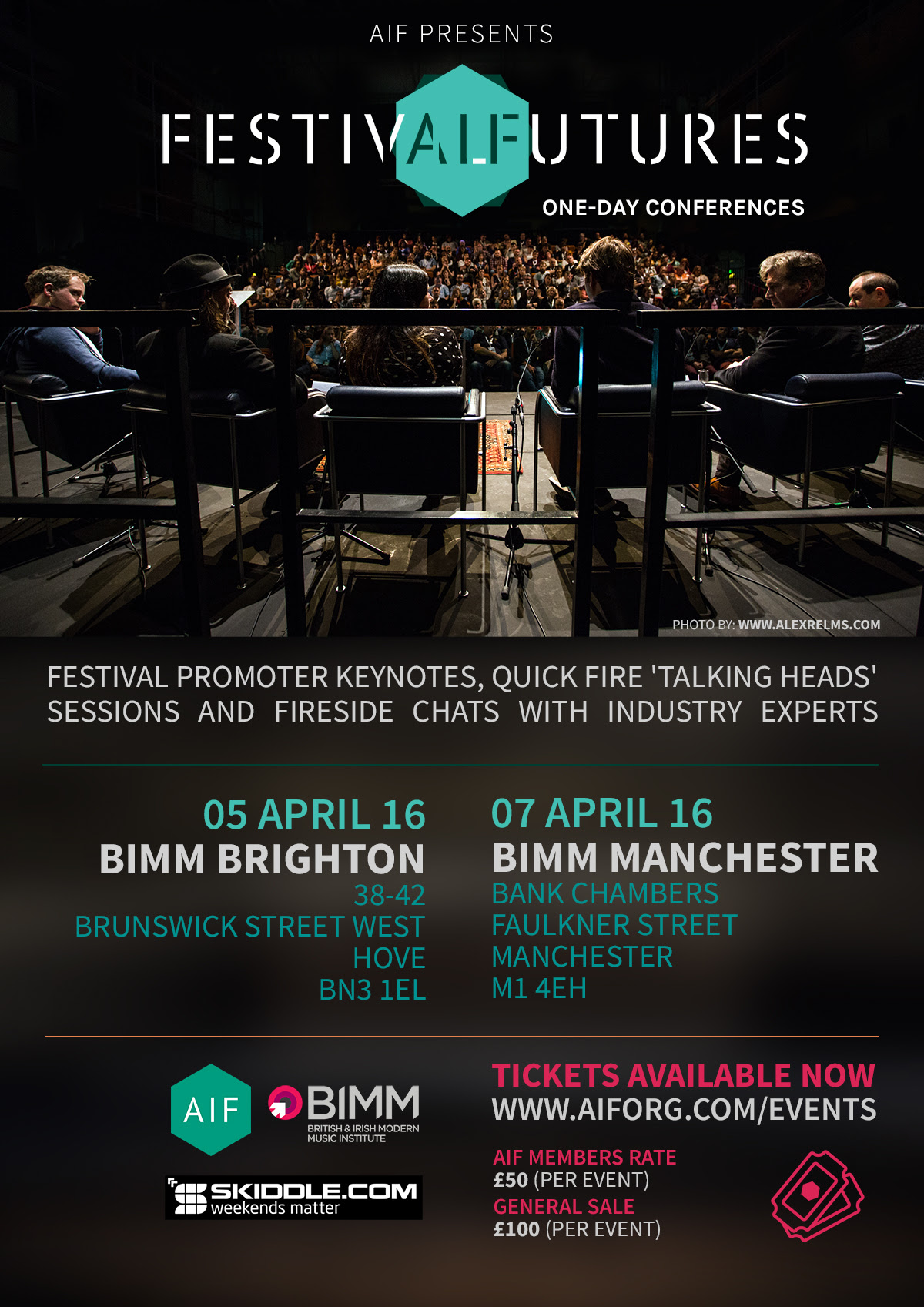Following last year’s GIITTV expedition to the Association of Independent Festivals (AIF) Congress in Cardiff (and our AIF Festival Congress Awards win!), we set off to Manchester for a pre-season warm up collaboration with BIMM entitled AIF Festival Futures. As expected, there were plenty of insights and revelations we are eager to share with you. Below is a quick introduction to some of the questions discussed. You can also watch our video to find out more about about the history of Kendal Calling, evolution of the UK festival market, relationships between small festivals and local venues and why it’s crucial to have an organisation representing the independent festival sector. Enjoy!
- What is AIF’s definition of an independent festival? Is it something to do with ethos, or size, or funding? We asked Paul Read, AIF manager and co-instigator of the AIF Festival Futures. His answer was surprisingly simple: “It’s based on market share. If you don’t hold more than 5% of the global turnover of the live music industry, then you are independent.”
- According to Ben Robinson – Creative Director of From The Fields whose current events portfolio includes Kendal Calling, Forgotten Fields and bluedot Festival – medium festivals are doing extremely well at mixing innovation production techniques and technologies. However, many larger festivals are still too attached to the old headliner model. Family events, such as Just So Festival, have also moved away from focussing on any specific acts to the community/tribal elements, producing lifestyle events with greater emphasis on arts programming and shared experiences.
- The idea of audiences as co-producers events is not something entirely new (e.g. Burning Man, traditional Zimbabwean festival culture) but it is something that many more festivals are embracing to create new 21st century visions of festival experiences. Dr Roxy Robinson’s presentation highlighted the examples of festivals promoting participation through audience-based performance, online open applications and creation of opportunities for becoming more engaged in social/political contexts.
- Music Venue Trust is a new UK-wide organisation (registered charity in England and Wales) created to preserve and protect UK network of grassroots music venues. Its recent achievements include effecting a change in national building planning legislation, resulting in greater protection to pre-existing music venues. Beverly Whitrick, Strategic Director of the Music Venue Trust, called for greater cooperation between festival promoters and local venues. Extended festival season means reduced opportunities for artists to play at local venues due to festival exclusivity clauses. Working on collaborative pre/post festival events, getting more involved in festival programming are all options that could benefit both parties.
- The rumours are true: streaming is the future of music. Sammy Andrews, music industry digital guru and 2015 Women in Music Rising Star winner, believes that despite the music industry’s terrible track record in supporting new talent, “we’re on the cusp of a big change”. Streaming provides a lot of data that can help artists and labels. Big ticketing companies are also starting to see the link between streaming and touring ticket sales. Virtual and Augmented Reality are also part of this new technology mix. VR may soon open new revenue streams for festival organisers and provide access to festival experiences for many more people. Some festivals, like Coachella, are starting to test VR options.
- Representing National Caterers Association (NCASS), Mark Laurie presented a brief history of festival food trends. From burger’n’chips washed down with pints of Carling to Michelin-star dining offered at boutique events like Wilderness and bluedot, within a space of 10 years festival food and drink provision has changed beyond all recognition. Born out of the 2008 financial crisis and fuelled by the rise of social media, street food revolution lead to the development of gorilla dining events and meat raves, and resulted in raising food standards at festivals. Food is now competing with live entertainment and has become an important element of many festival bills.
- Katy Mcleod from Chill Walfare offered a few uncomfortable facts linked to festival drug awareness and welfare provision. It may come as little surprise that 87% of people requiring welfare support at festivals use multiple substances. The surprising element was Katy’s admission that alcohol was the most difficult drug to deal with. Sniffer dogs at the gates not only encourage those in possession of drugs to consume their weekend supplies in one go, turns out 74% of the time they give false positives. And the saddest thing is the fact that legal high usage goes up whenever these substances receive media attention.
Video credit: Helen Griffiths Videography




